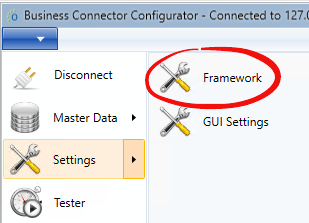Performance Settings
Each interface has specific properties that can be configured in the Ometa Framework.
Configuration
You can configure the interface processes in the Ometa Framework by following these steps:
- Click the blue application menu in the top left corner.
Click Settings and then Framework.

Click Interface Server.

Properties
| Property | Description |
|---|---|
| Port | Specify the port number for the interface server. |
| Buffer Size | A larger buffer size potentially reduces the number of empty acknowledgements (TCP packets with no data portion), but might also delay the recognition of connection difficulties. Consider increasing the buffer size if you are transferring large result sets or you are using a high bandwidth, high latency connection (such as a satellite broadband provider). Changing this property requires a restart of the BCSL service. The buffer size is expressed in bytes. |
| Maximum Amount of Interface Memory | The maximum amount of memory (in Mb) an interface process may use. If the memory usage of an interface process is higher than this limit three times in a row, it will be closed. |
| Idle Time Allowed | The time (in minutes) an interface process can be in the idle state before shutting down. |
| Maximum Instances Settings | These are settings that allow a more specific limit to the maximum number of instances an interface process may have. You can configure a maximum instances limit for a specific time frame on a specific day. |
Cancel Work After Losing BCM Connections
When an interface worker loses its network connection from the BCM request, it will automatically attempt to stop any work that is currently still running if possible.
Any work based on reading data will be cut off immediately, while adding or updating data will be kept running to avoid unforeseen data loss or data corruption. The interface determines to cancel work based on the method type:
| Method Type | Work Cancelled |
|---|---|
| MultiRead | Yes |
| SingleRead | Yes |
| Create | No |
| Update | No |
| Delete | No |
| Action | Yes |
This behaviour exists to free up CPU and memory usage of the host system. Especially long running and heavy work can have an impact on resources and when the interface worker is not able to send any data back to the requester, it is useless to continue and would needlessly use system resources that can be assigned to other work.